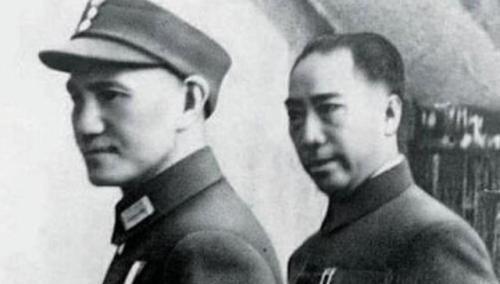The War of Resistance Against Japanese Aggression was an extremely arduous war of anti-aggression in Chinese history, in which the Chinese paid a terrible price in order to resist the aggression of Japanese imperialism. However, in this war, there were some generals who colluded with the Japanese army, or in order to preserve their strength, they defected as puppet troops, and Han Fuyu was a typical representative.

Han Fuyu had turned to Feng Yuxiang in the early days, and Feng Yuxiang saw that he had a certain culture, his appearance was Sven, and he could write a good hand, which was very important to him. Because of his bravery in battle, Han Fuyu soon became Feng Yuxiang's right-hand man with Shi Yousan, Sun Liangcheng, Liu Ruming and others, and became one of his thirteen Taibao. In 1925, Han Fuqu served as the commander of the 1st Brigade of the 1st Division of the 1st Army of the National Revolutionary Army. In November, the National Revolutionary Army attacked Tianjin, and he was the first unit to lead his troops into Tianjin, and was thus promoted to commander of the First Division of the First Army and commander of the Tianjin Garrison. In 1929, under Chiang Kai-shek's heavy bribes, Han Fuyu betrayed Feng Yuxiang and accepted Chiang Kai-shek's appointment as commander-in-chief of the Third Route Army.
In 1930, during the Great War of the Central Plains, Han Fuyu led his troops to Shandong and began his seven-year rule over Shandong. In order to preserve his strength and consolidate Shandong's territory, Han Fuyu withheld taxes in Shandong, expanded his army, and drove out the officials of Shandong by the Nationalist government, and became the king of Shandong himself.
After the victory of the War of Resistance Against Japanese Aggression, Chiang Kai-shek, in order to win over Han Fuyu against Japan, appointed him deputy commander of the Fifth Theater and commander-in-chief of the Third Army, responsible for commanding the Shandong military and undertaking the defense of the Yellow River. During the initial engagement between Han Fuyu and the Japanese army, Han Fuyu's troops suffered heavy casualties. Therefore, in order to preserve his strength, Han Fuyu almost retreated without a fight, took the initiative to abandon the natural danger of the Yellow River Taishan, and within a few days abandoned the Yellow River defense line that was expected to be able to be defended for several weeks. Han Fuyu and other warlords secretly formulated anti-Chiang kai-shek plans, and in order to preserve their own strength, Han Fuyu also colluded with the Japanese to reach a series of traitorous agreements.
At that time, the Chinese battlefield was very unoptimistic, the troops suffered heavy casualties, and in the face of the Japanese army's attack, Chiang Kai-shek also wanted to kill a hundred and deter some generals who did not resist, so he set his sights on Han Fuyu. During the Battle of Xuzhou in 1938, Chiang Kai-shek convened a military conference in Kaifeng and asked all divisional and above generals in the First Theater and the Fifth Theater to participate. Dai Kasa personally selected a group of agents to prepare to arrest Han Fuyu, and Han Fuyu also had his own eyes and ears, but Dai Kasa was very cautious about this operation, and Han Fuyu did not perceive anything unusual.
In order to reassure Han Fuyu, Li Zongren, commander of the Fifth Theater who had long been dissatisfied with Han Fuyu, also expressed his position that he would ensure Han Fuyu's safety. When kaifeng was finally opened, Han Fuyu was still not at ease, and took a regiment of troops and ten guards to Kaifeng in a special train. As soon as Han Fuyu arrived at the Kaifeng Railway Station, Liu Zhi, Song Zheyuan, and other generals, deputy commanders of the First Theater, hurried up to greet him and deceived the guard troops he led.
After Han Fuyu arrived at the venue, Dai Kasa arranged for people to collect his weapons, the guards were also withdrawn, and many senior generals greeted him and diverted his attention. After Chiang Kai-shek arrived at the scene, he began to speak on the combat situation in the Fifth Theater, but as he spoke, his words suddenly turned sharply, and the contradiction pointed directly at Han Fuyu: "Han Fuyu, you stand up." I ask you, why don't you carry out the military order? Why give up Jinan? Unconvinced, Han Fuyu directly confronted Chiang Kai-shek: "It is my fault to abandon Jinan, please ask the chairman of the committee, who should be responsible for abandoning Nanjing?" Han Fuyu's words directly made Chiang Kai-shek unable to step down, and Chiang Kai-shek's face changed and he said: "Nanjing has given up, and naturally someone is responsible." I'm not asking about Nanjing, I'm asking about Jinan. ”
Han Fuyu also argued with Chiang Kai-shek, and was pulled out of the venue by Liu Zhi, and Han Fuyu pushed away the chair and walked out breathlessly. Han Fuyu had just been tricked by Liu Zhi to the door, and the military command agents who had been waiting for a good one jumped out and pressed Han Fuyu into a small car. After passing by the court-martial, Dai Kasa personally led someone to kill Han Fuyu. Chiang Kai-shek was very satisfied with the operation of the military command and also commended Dai Kasa and the special agents of the military command who carried out this mission. Chiang Kai-shek's action did shock some wavering generals, and later at the Battle of Xuzhou, the units of the Fifth Theater caused heavy casualties to the Japanese army.